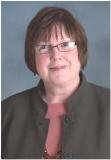Spring 2010 |
Volume 4, Issue 2 |
Skip Table of Contents | ||||||||||
In This Issue
|
The College of Humanities Newsletter
Humanities professor chronicles the struggles |
|||||||||||
Dr. Marta López-Garza, Professor, Chicana/o Studies & Gender and Women’s Studies Department, has spent the past five years on a passion project, a documentary on the reintegration of formerly incarcerated women into their local communities titled, "When Will The Punishment End?" The main objective of the film is to chronicle the challenges formerly incarcerated women face as they attempt to rebuild their lives, reunite with their children and families, and find housing and employment. The motivation for this project was Dr. López-Garza’s concern over the alarming increase in the number of women in prison. The number in state and federal prisons has increased nine-fold, from 12,300 in 1980 to 112,498 in 2006 (Bureau of Justice Statistics 2008). Equally concerning is what happens when they are released. In 2002, a total of 16,787 women were transferred out of the prison system and returned to their home communities. Factors which facilitate successful reentry include safe places to live , recovery programs, and education. The main barriers to successful reentry into society are the lack of employment opportunities as well as cuts in social service programs. Other barriers include the fear, discrimination, and prejudice exhibited on the part of potential employers, landlords, service providers and the general public. Finally, regressive laws and policies prohibit ex-offenders from even being considered for employment, housing and social services. The film documents the political awakening of many of the women and the efforts of All of Us or None, an organization of the formerly incarcerated, to advocate for fair policies and laws and employment opportunities. The documentary serves as an educational tool, not only for family and community members, but also for the larger society: to better inform prospective employers, service providers, elected officials and policy makers. Thus far the film has been screened at the Community Coalition in downtown Los Angeles, the College of Humanities Film Festival, and also on March 16 at the CSUN Noski Auditorium when a standing-room-only crowd viewed the film, followed by a panel discussion with four of the women featured in the documentary (Susan Burton from New Way of Life in Watts, Monica Stel from Harbour Area Halfway Houses in Long Beach, Kim Carter from Time for Change in San Bernardino, and Dr. Marilyn Montenegro). Dr. López-Garza plans to write a book using research gathered, create a website, and to submit the film to festivals and to national media outlets such as PBS. — Submitted by Joshua Einhorn |
| page: | 1 | 2 | 3 | 4 |

